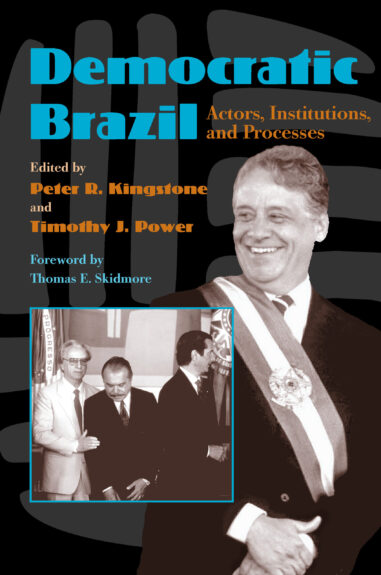Democratic Brazil
Actors, Institutions, and Processes
The potential reader of this volume is in luck. [Democratic Brazil] is an exceptionally clear and informative handbook for understanding how another 'emerging country' fell victim to the perils of globalization. . . . An invaluable guide.
Request Exam or Desk Copy. Request Review Copy
After 21 years of military rule, Brazil returned to democracy in 1985. Over the past decade and a half, Brazilians in the Nova República (New Republic) have struggled with a range of diverse challenges that have tested the durability and quality of the young democracy. How well have they succeeded? To what extent can we say that Brazilian democracy has consolidated? What actors, institutions, and processes have emerged as most salient over the past 15 years? Although Brazil is Latin America's largest country, the world's third largest democracy, and a country with a population and GNP larger than Yeltsin's Russia, more than a decade has passed since the last collaborative effort to examine regime change in Brazil, and no work in English has yet provided a comprehensive appraisal of Brazilian democracy in the period since 1985.
Democratic Brazil analyzes Brazilian democracy in a comprehensive, systematic fashion, covering the full period of the New Republic from Presidents Sarney to Cardoso. Democratic Brazil brings together twelve top scholars, the “next generation of Brazilianists,” with wide-ranging specialties including institutional analysis, state autonomy, federalism and decentralization, economic management and business-state relations, the military, the Catholic Church and the new religious pluralism, social movements, the left, regional integration, demographic change, and human rights and the rule of law. Each chapter focuses on a crucial process or actor in the New Republic, with emphasis on its relationship to democratic consolidation. The volume also contains a comprehensive bibliography on Brazilian politics and society since 1985. Prominent Brazilian historian Thomas Skidmore has contributed a foreword to the volume.
Democratic Brazil speaks to a wide audience, including Brazilianists, Latin Americanists generally, students of comparative democratization, as well as specialists within the various thematic subfields represented by the contributors. Written in a clear, accessible style, the book is ideally suited for use in upper-level undergraduate courses and graduate seminars on Latin American politics and development.
More Praise
An exceptionally valuable book with contributors from a new generation of American scholars . . . Rich in detail and interpretation, this is one of the best collective efforts on Brazil in years, reflecting a nation transformed over the past two decades.
It provides information and impressions about the New Republic and how it really operates. It moves beyond the rhetoric of democratization and theorizing about elections and talks about how money and political maneuvering can often outvote idealism. It confronts the distance between the demands of market power, concentrated in the public arena within the media, and the need of most Brazilians for empowerment and access to social goods. The editors and authors are here complimented for such a path-breaking study.
Each chapter is an admirable introduction to a much larger and complex debate. Impressive use of empirical data and an ecumenical approach to theories of democracy. . . .Ultimately, Democratic Brazil offers a useful contribution to both the study of Brazil, and, through its careful intermingling of different theoretical approaches, to the understanding of democracy and democratization.
stands out sharply as the first thorough and systematic book-length evaluation of the workings, progress and products of Brazilian democracy over the 15 years since the military dictatorship ended in 1985. ... The book is particularly strong in its examination of the social aspects of Brazilian democracy. ...covers the gamut for a comprehensive, thorough and nuanced picture of Brazilian politics that is a commendable starting point for the academic generalist or the advanced undergraduate yet provides new insights and interconnections for the laready informed specialist.
... provides the most comprehensive and balanced appraisal to date of Brazil's fledgling democracy by presenting twelve essays that evaluate various components of the new political and societal configuration.... leaves the reader with an incredibly detailed description and understanding of many of the most fundamental aspects of Brazil's political system.
Democratic Brazil is indispensable to understanding state and society in contemporary Brazil. Kingstone and Power have done an excellent job in putting together this collection. The contributors are the best of the new generation of U.S.-based Brazilianists, and their work in this volume is consistently well-researched and well-written.
360 Pages, 6 x 9 in.
March, 2000
isbn : 9780822957140
Series
about the editors


Peter R. Kingstone is professor of politics and development and cofounder of the Department of International Development at King’s College London. He is the author of several books, including Crafting Coalitions for Reform: Business Preferences, Political Institutions and Neoliberal Reform in Brazil; The Political Economy of Latin America: Reflections on Neoliberalism and Development; and is coeditor, with Timothy J. Power, of Democratic Brazil: Actors, Institutions and Processes, and Democratic Brazil Revisited.
learn more



Timothy J. Power is university lecturer in Brazilian Studies and fellow of St. Antony’s College, University of Oxford. A past president of the Brazilian Studies Association, he is the author of The Political Right in Postauthoritarian Brazil.
learn more


